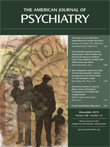T
o the E
ditor: A 37-year-old man suffering from spinocerebellar ataxia type 10 manifested new-onset psychosis with violence. He and his brother inherited this ataxia from their father, who had also developed poorly controlled anger and aggression. Spinocerebellar ataxia type 10 is a culturally segregated and rare autosomal-dominant disease that is characterized by a slowly progressive cerebellar gait and appendicular ataxia associated with epilepsy in the majority of patients (
1). This disease belongs to the rapidly enlarging family of polynucleotide expansion disorders (e.g., Huntington's disease and Friedreich's ataxia). Specifically, spinocerebellar ataxia type 10 results from an intronic pentanucleotide expansion within the ataxin-10 gene (
ATXN10; 22q13), observed almost exclusively in patients of Mexican and Brazilian descent. In contrast to the more familiar manifestations of Huntington's disease, severe psychiatric symptoms have not been commonly described for spinocerebellar ataxia type 10 or many of the other inherited ataxias.
Until 3 months before admission, our patient was free of psychiatric symptoms, and his medical history was significant only for stable ataxia and a seizure disorder, which was well controlled on a combination of carbamazepine and zonisamide. That his affected brother developed identical neurological symptoms, but in reverse order, nicely illustrates the fact that a single mutation can produce widely varying clinical phenotypes, even among siblings with very similar genetic backgrounds.
The onset of psychiatric symptoms began with delusions of being in the presence of his deceased grandfather, but they remitted soon after treatment with risperidone (1 mg/day). Three months later, despite medication adherence, the patient abruptly developed visual illusions and hallucinations, soon followed by profound irritability and impulsive violence. A comprehensive evaluation at the UCLA Neuropsychiatric Hospital revealed no seizure activity, metabolic disturbances, intoxications, infections, or other acute medical etiology, although the possibility of a mixed manic episode could not be ruled out, given the patient's previous irritability. While zonisamide can induce psychosis, the patient's long and stable history made this a less likely culprit. He was discharged psychosis free and euthymic with prescriptions for risperidone (2 mg b.i.d.) and trazodone (50 mg every evening).
A review of the literature revealed four Mexican families with reported behavioral changes and etiologically undefined aggressiveness based on results from the Minnesota Multiphasic Personality Inventory (
2). Given the predilection toward violence exhibited by our patient and his father, we speculate that anger and aggression are subclinical manifestations of mania and psychosis in spinocerebellar ataxia type 10. More importantly, comorbid psychopathology might represent the norm, rather than the exception, among patients with similar inherited neurogenetic diseases (
3).

